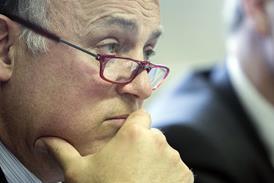- Tariff proposals will propose to cut the payments made to hospitals for traditional outpatient appointments
- An engagement process around a two year tariff from 2019-20 is due to start next week
- Changes to the “market forces factor” will also be put forward, which could prove controversial in London
NHS leaders are proposing to cut the payments made to hospitals for traditional outpatient appointments, HSJ understands.
An engagement document for the national tariff payment system, expected to be published by NHS Improvement and NHS England next week, is also set to introduce proposed changes to the “market forces factor”, which could lead to income reductions for larger teaching hospitals in London.
The next “payment by results” tariff, the mechanism through which providers are paid according to the volumes of activity they carry out, would cover a two year period from 2019-20. An engagement period with local leaders will be followed by a formal consultation.
Senior sources have told HSJ that the document will put forward changes that incentivise providers to transform their traditional outpatient models, which are likely to be geared at reducing the number of consultant-led appointments and incentivising hospitals to conduct more appointments remotely.
Last week, Ian Dalton and Simon Stevens, the respective chief executives of NHSI and NHSE, both spoke of the need to transform outpatient services, which are routinely operating under an “obsolete” model.
The engagement document is also expected to introduce an update to the market forces factor, which is a mechanism within the tariff that takes account of cost variations in different geographies.
The MFF has not been updated for several years and critics have complained that it is overly favourable to larger teaching trusts in London which provide specialised services.
The document is also expected to address the payment system for urgent and emergency care and signal an intention to simplify it. One source said there was recognition from NHSI that some trusts are coming under severe financial strain because of the “marginal rate”, which offers providers only 70 per cent of the tariff price for emergency admissions above a pre-determined baseline.
However, it is not thought that extensive details will be put forward.
It comes as discussions take place over the future of “provider sustainability funding” (formerly named sustainability and transformation funding) from 2019-20. It is currently allocated according to volumes of emergency activity, but is only paid if financial targets are met, so must be treated as non-recurrent income.
NHSI is thought to be pushing for the £2.4bn fund to be paid recurrently. It’s unclear whether this would go through the tariff or through a different mechanism such as a direct payment.
NHSI and NHSE did not wish to comment.
NHS Providers, which represents provider trusts, said the tariff would be a key part of resetting the current financial framework, but said it was “disappointed that further changes have not been made to reform the urgent and emergency care payment system”. The marginal rate had removed around £340m from providers’ income last year, it said.
David Williams, policy advisor on finance at NHSP, added that there would also be risks around changing the MFF, which could “undermine the financial stability for some providers, particularly specialist and London based teaching hospitals”.
He added: “We would welcome the opportunity to develop these proposals to reflect the reality of the situation faced by trusts.”
Anita Charlesworth, director of research and economics at the Health Foundation, said: “The need for continuous improvements to productivity isn’t changed by the prime minister’s annoucement of extra funding. In that context, while as ever the devil will be in the detail, focusing tariff changes on ensuring fair funding with a revised market forces factor and transformation of outpatient services must be right.”


























21 Readers' comments